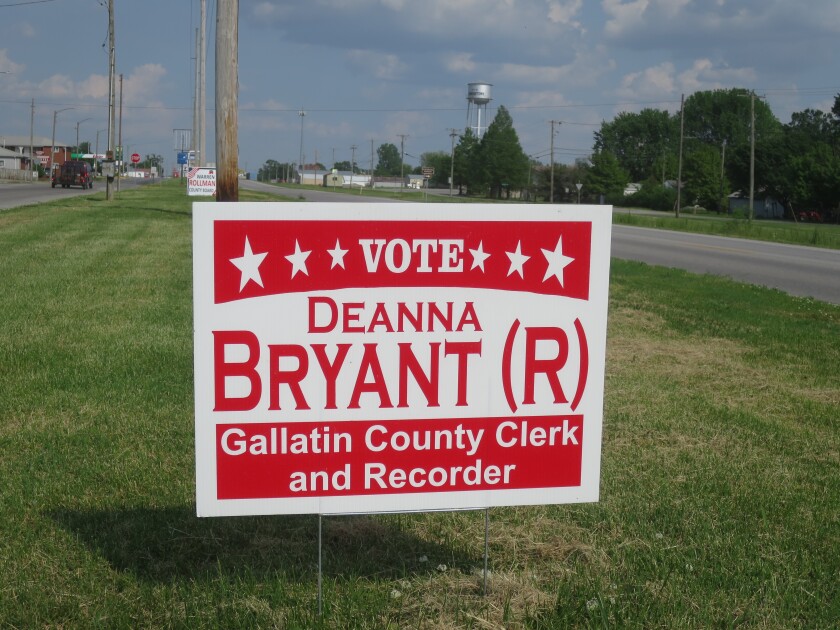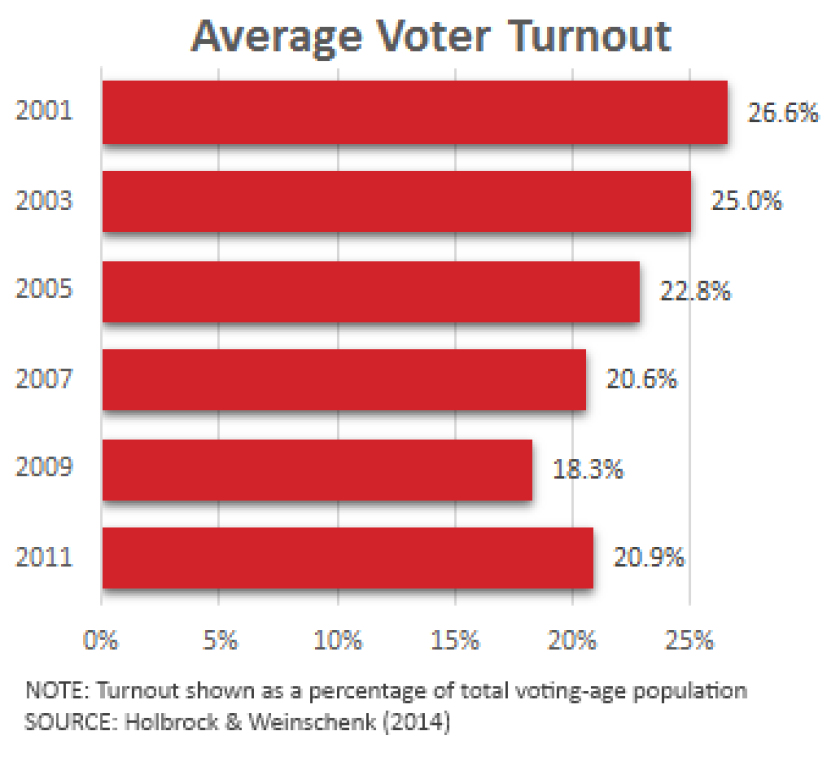Manny Diaz, who chairs the Florida Democratic Party, complained that DeSantis had turned school board races into “new political battlegrounds.” If that’s the case, DeSantis is not alone. Across the country this year, legislation was introduced in about a dozen states to turn traditionally nonpartisan school board elections — sometimes along with other municipal contests — into partisan affairs.
This reflects the fact that schools have become primary fronts in the culture wars. But it’s also in keeping with the broader trend of everything surrounding government becoming more polarized, with the two major parties seeking advantage in every conceivable setting.
This year, the Republican parties in states including California and Texas have recruited and supported candidates for school board and other local offices, while allied groups such as religious conservatives have provided financial support. Multimillion-dollar political action committees are getting involved in school board races, traditionally low- or no-budget affairs.
For the past five years, the progressive group Run for Something has encouraged Democrats to run for state and local offices, including an $80 million effort to promote candidates for local posts that oversee elections. “You know that deep sense of regret our party has about not investing in state legislatures in 2009/2010?” Run for Something co-founder Amanda Litman tweeted earlier this year. “In a decade, we’re going to feel that 100x over about city councils, local election admins, & school boards. And then it could be too late.”
The feeling that a lot’s at stake at the local level has been amplified by pandemic politics and the myriad fights over policies such as mask mandates and vaccine requirements. School closures have played a big role, as have conservative complaints about supposed indoctrination when it comes to instruction about race, sex and gender.
But there’s also a sense that if an area is Republican, its elected officials should be Republican (or Democrat, as the case may be). With people voting the same way up and down the ballot — with a lot less variation than there used to be between the local presidential vote and voting for Congress or legislatures — why not let them know what they’re getting when it comes to the city council or school board?
“Declaring a party affiliation would give the voter a clue to the candidates’ political leaning,” says Missouri state Rep. Bruce Sassmann, who sponsored a bill to make local and special district elections partisan. “Stating their preference as a Democrat or Republican would be a language understood by the voter.”
Many local races are nonpartisan only in a technical sense and party labels indeed offer actionable information for most voters. Still, there are also risks. Everything growing more partisan at other levels certainly hasn’t led to a flowering of increased cooperation. Loyalty, say, to Donald Trump might not be the greatest imaginable qualification for serving on the sewer board.
Local government officials spend much more time worrying about service delivery than partisanship, says James Brooks, of the National League of Cities. “The notion of a political agenda driven by one party or the other doesn’t seem to translate at the local level,” Brooks says. “Ideology doesn’t seem to break down that way when you’re talking about trash pickup or bus shelters.”
Why Local Elections Aren’t Partisan
The idea of making local elections nonpartisan was part of the wave of Progressive Era reforms a century ago. The goal was to combat machine politics. In those days, a mayor or other machine operator could dole out patronage jobs and contracts in exchange for votes to keep himself and his party in power.
“Progressives, in the early 20th-century sense, viewed making local government nonpartisan as a way of making governments more efficient,” says Chris Warshaw, a political scientist at George Washington University. “They really wanted to get those party machines out of local government.”
As a result, particularly in the middle of the country and the West Coast, most local offices are nonpartisan. But the idea that making elections nonpartisan made them nonbiased was always false. To some extent, the move was an attack on the power of big cities. And it certainly represented an effort to dilute the power of immigrant and other minority voters.
“All of these are failed promises,” says Megan Goldberg, who teaches American politics at Cornell College in Mt. Vernon, Iowa. “They did take the wind out of the sails of the party machines and undermined the patronage system that had problems with accountability, but it’s had the effect of really low turnout elections that only the people who already have a lot of power show up for.”
Local elections are often held in odd-numbered years and non-November months, intentionally scheduled not to coincide with major state and federal races. That’s a major reason they have lower turnout, but lack of partisan identification is also part of the story. One study of Virginia elections found that adding party labels to offices at the state level increased voter participation, particularly among African Americans.
“Turnout in local elections is abysmally small,” Warshaw says. “The upside for party labels is that it does enable less-informed voters to make some judgment about whether their policy views are likely to match their own.”
Benefits of Clear Partisanship
People in local government like to view themselves as problem solvers fulfilling no mission other than serving their own communities. There’s no Republican or Democratic way to pick up the trash, they’ll often say.
That’s clearly nonsense. A Republican administration is more likely to contract out trash pickup, while Democrats are more likely to employ unionized workers. “There’s very little social science research that nonpartisan elections contribute to good government,” Warshaw says.
Arguably, voters in many places currently have the worst of both worlds. They may be choosing between candidates who in their hearts are closely aligned with either Democrats or the GOP, but they don’t have the clarity of knowing for sure. “Local elections have long been nonpartisan in name only,” says Lori Riverstone-Newell, a political scientist at Illinois State University. “Everyone paying attention to local politics knows how to interpret the ideology behind candidates’ messages.”
But not everyone is plugged in. With little to no media coverage of local elections, voters may have very little sense of what candidates stand for. At least if they have an R or a D after their names, voters will have a clue about whether their overall value systems jive with their own, even if they don’t know their specific platforms. “My motivation for filing this bill is about transparency and the discovery of a candidate's political philosophy,” says Sassmann, the Missouri representative.
Possible Perils
It’s not hard to imagine some problems that could easily result from turning local elections into partisan affairs. It’s already the case that some local candidates run on cookie-cutter platforms derived from national advocacy groups, as opposed to actual, organic concerns from their communities. If they run formally under a party banner, it’s much more likely that they’ll be spewing talking points, or be forced to answer where they agree or disagree with national leaders.
Having to opine on jurisdictionally irrelevant conflicts in Washington, D.C., will do nothing to address questions such as whether to allow more accessory dwelling units or change the timing of traffic lights, says Brooks, the National League of Cities official. “The only place where you would see people make a decision based on political philosophy is new programs and spending,” he says. “Citizens who want smaller government can have an opportunity to vote against bond issues or tax increases that expand the role of government.”
If partisan politics goes local, it’s likely that one party or the other would dominate most races in most places. Democrats, who already hold the vast majority of major city mayoralties, would continue to rule big cities and college towns, while Republicans would be kings in rural and exurban areas. They may well end up with more elected officials who better represent their viewpoints.
Having municipalities clearly label themselves as Democratic or Republican has an obvious downside, however. State lawmakers have become much more eager in recent years to preempt local authority or otherwise punish localities that aren’t on board with their agenda. And local partisan dominance could revive the worst characteristics of the old machines. Single-party dominance at any level of government can lead to corruption, with no one positioned to challenge the status quo.
Partisanship is not a great tool for accountability at the local level, says Justin de Benedictis-Kessner, a public policy professor at Harvard University. “There are potential downsides, especially if one side is better at mobilizing and getting candidates for their races,” he says. “If there’s one-party capture of all these races, you’re not going to get meaningful competition.”
If weighing the pros and cons of partisan local elections is a complicated business, one thing seems clear: In an era when everything is becoming more partisan, local elections will, too.

Related Articles












